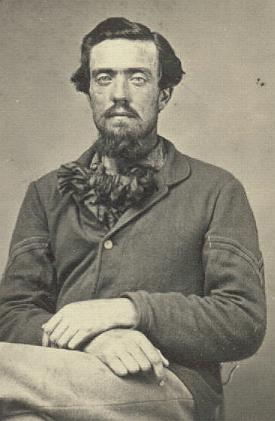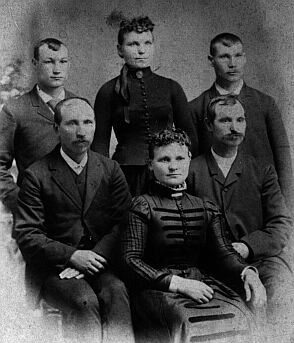Corporal Chauncey William Stroud
Fifth Iowa Volunteer Cavalry

Corporal Stroud Wearing a Stylish Cravat

Little distinguished Chauncey W. Stroud from the majority of his contemporaries who heeded President Lincoln's call to suppress the "rebellion" of southern states which threatened to tear apart the Union. Indeed, little distinguished the bulk of northern recruits from the fellow patriots responding to a similar call to arms south of the Mason Dixon.
Like most of his fellow soldiers, Chauncey was a farmer by trade. As were many of his contemporaries, he was a child of America's westward migration: born in Mesopotamia, Ohio (on the Pennsylvania border), he served in an Iowa regiment during the war, lived for many years in Missouri, and left this mortal life in Nebraska.
He endured the hardships common to the soldier of every era. In addition to performing all of the traditional combat and garrison duties of the cavalry trooper, Chauncey's military records also report service as a regimental teamster. On at least one occasion, he was also dispatched from the deeper south to transport new mounts from Tennessee. His regiment was involved in several major engagements, and numerous smaller skirmishes. It was during one of these that Chauncey experienced an injury which would plague him to the end of his life.
In December of 1864, in a brief skirmish on the Duck River (during the Nashville Campaign), Chauncey's horse fell on unsure ground and he lurched forward on the saddle horn. He was seriously ruptured, and spent several weeks recovering in the hospital before he was able to return to duty. Like thousands of his fellow veterans, his body never fully recovered from the scars left by shot, disease, deprivation, injury or imprisonment. Chauncey would need to wear a special truss the remainder of his life, and learn to live with the constant pain.
Following the war, Chauncey shared in the difficulty of many veterans in obtaining compensatory benefits for his disability. Imperfect record-keeping in field hospitals--which had their hands full trying to save the lives of those in their charge when rampant infection often completed the job begun imperfectly by musket ball--were of no avail. Unfortunately, by the time his injury required him to seek governmental assistance, his company commander (who, of course, knew the specifics of the case) was already dead.
The documentation included in his veteran's file is interesting, and is duplicated in the equivalent records of thousands of other veterans. Chauncey's claim was determined valid, and this old soldier received $10.00 a month until his death. With his passing, his widow Emma received a reduced amount for herself and her children.

Reputed Postwar Picture of Chauncey, with Wife Emma and Her Siblings
Including George Washington Carey and Abraham Lincoln Carey
Chauncey's descendants have continued to serve their nation in uniform. His son, Charles William Stroud, a railroad bridge builder, served on the Mexican border during the First World War. His grandson, Charles Stroud, made the military his life's career, retiring from the United States Marine Corps as a Sergeant Major in 1975. Enlisting in 1946 at the age of 17, he served with the occupation forces in Japan and in both the Korean and Vietnam wars. Chauncey's great-grandson, Robert Charles Stroud, currently serves as a chaplain in the United States Air Force.
The Fifth Iowa Cavalry site is deeply indebted to Michael Breeling for sharing the civil war image of Chauncey, for which he maintains the copyright.

Other Strouds Who Served
Return to the Fifth Iowa Cavalry Personnel
Return to the history of the Fifth Iowa Cavalry